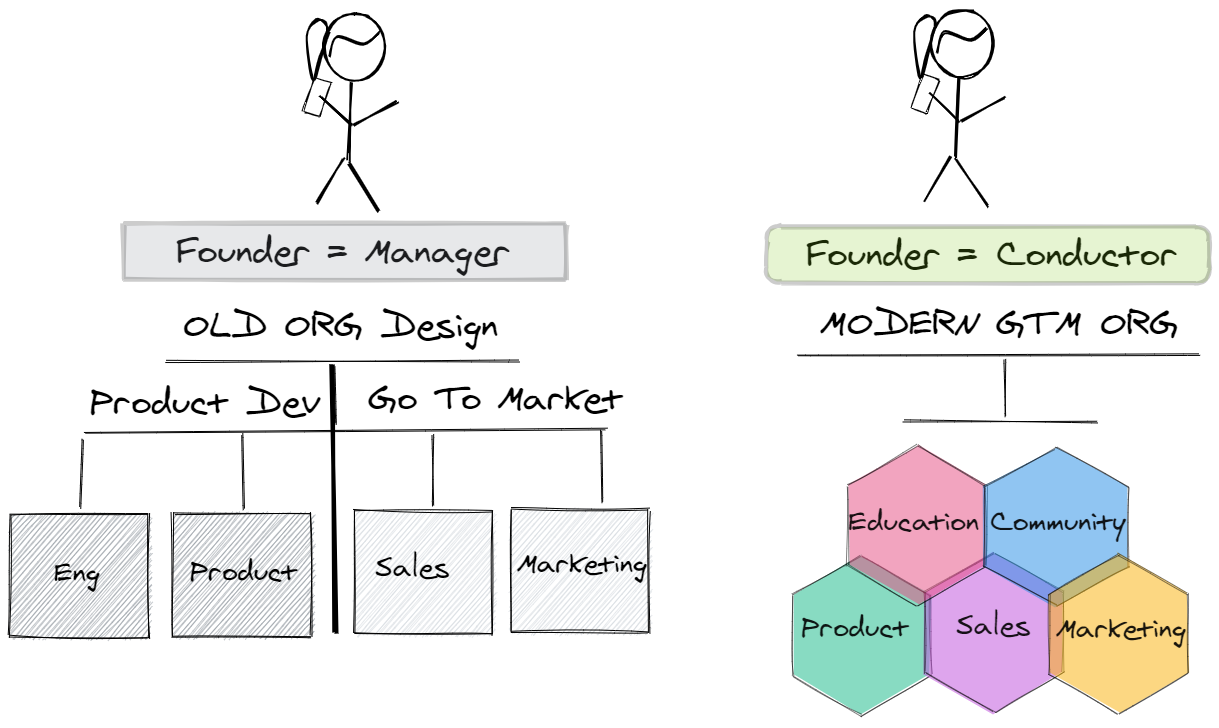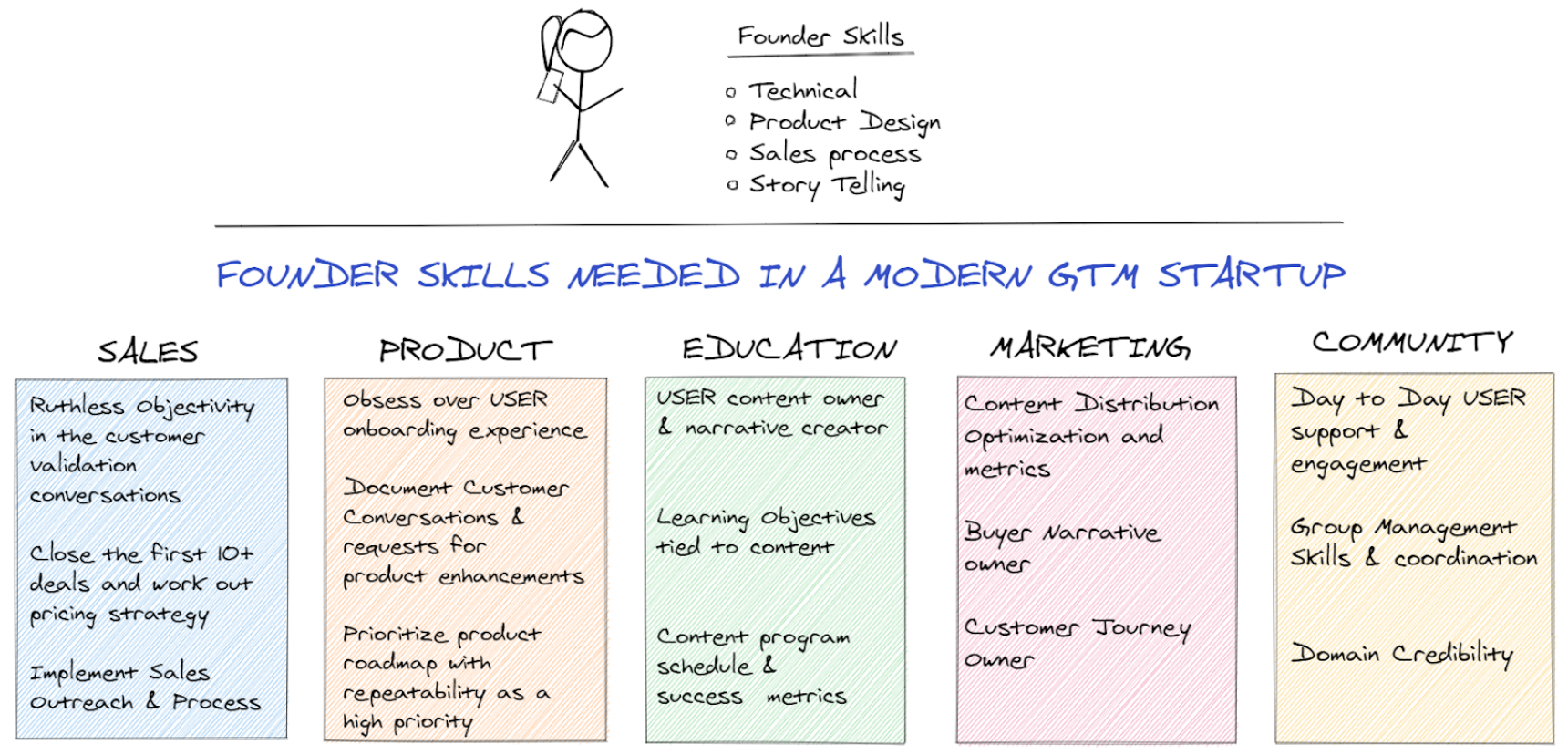
As a founder, execution begins with your team. Building a startup with the Modern GTM requires an organization with a high degree of teamwork among people who have a variety of skills.
Enterprise startups that executed with the old enterprise GTM model had engineering and product teams that did their work in a more serial, siloed fashion, and sales and marketing were tasked with finding the best way to penetrate an organization and complete a sales process. In the modern GTM, the teams in the organization are much more interdependent.
In the old GTM, the founder played more of a manager role. In the Modern GTM for enterprise businesses, the founder must act as a conductor, orchestrating the interwoven activities of five groups: product, education, community, sales, and marketing. As any experienced founder will tell you, there will be periods where the founder is also the leader and builder of one or more of the functions! Who said this was easy?

As a founder, it’s critical to decide which role in the Modern GTM organization you’re going to fill and which roles you’re going to hire for (and in what order). The process starts with understanding the skills needed for the startup to succeed and the skills you (and your co-founders) have. As we consider the full spectrum of skills required in a team to execute the Modern GTM, we recommend organizing the list this way:

In the Unusual Ventures model, education is a full-time responsibility. Why? Our strong belief is that the best way to attract potential USERS is to produce quality educational content — it turns out people like to learn (even more so in a pandemic). Quality educational content is not marketing material.
Marketing is ultimately responsible for creating a sales pipeline, so if you task the product marketing team with producing educational content, you’ll likely get fantastically polished stuff that sets off the “BS” detector in most USERs. Good educational content is designed with learning objectives in mind and addresses USERS’ legitimate technical or tactical problems in an authentic way.
The marketing team works closely with the education team, but is responsible for three things:
Marketing collaborates with product to distribute content to trial USERS to keep them on track for reaching that “aha” moment.
The Modern GTM product works closely with every function in the organization. Product helps the education and marketing teams define and create the necessary materials for onboarding, using the product, etc. Product is responsible for the USER experience once the USER lands anywhere on the startup’s website and experiences content and the solution. Founders take note that marketing and product teams work closely on the website UX to provide the USER with accurate positioning and consistent messaging.
At Unusual, we encourage product people to obsess over “the time to value” for a new USER and work closely with our founders and teams to constantly improve this element of the GTM funnel. Product in the Modern GTM constantly improves the USER’s experience to drive better conversion of visitors to the website to trial USERs and, ultimately, paying customers.
The Modern GTM introduces a second new role in a startup — community management. Founders need to appreciate that new prospective USERs are not interested in engaging with salespeople. However, they do want to feel supported and appreciate having questions answered from an active source. Community management has become an essential role in the Modern GTM as it supports day-to-day engagement and is an invaluable source of quality feedback for product Management, education, and marketing. We generally recommend keeping salespeople away from community so as not to interfere with the USERs’ journey!
In the Unusual version of the Modern GTM, we frequently recommend that the FIRST hire founders make is an experienced sales executive. This may feel counterintuitive, but consider this: The No. 1 weakness most founders have is being intellectually honest about whether someone is truly desperate for the product they’ve built. Trust me, I can speak from personal experience! As the founder of Unusual, I want to believe every early-stage founder is a fit for our firm and engagement model, but that’s just not true.
Experienced salespeople are like water and gravity — they find the fastest path to the money. Experience teaches salespeople to bring ruthless objectivity to those early customer conversations that steer every function in a startup to put the company on the path to product-market fit. That critical feedback drives the company to prioritize the right product features, sharpen the educational and marketing content, hire the necessary skills in engineering, and achieve the traction goals to raise the next round of funding. In this regard, nothing has changed in the last four decades. Old GTM or Modern GTM — it doesn’t matter — quality sales experience and judgment brings an essential dynamic to an early startup.
For a founder, assembling the right team to successfully execute the Modern GTM is certainly not easy and requires a high degree of self-awareness. Knowing what skills you as a founder bring to the organization and what skills need to be hired can be the difference between early success and failure. A founder is responsible for making sure the organization always has the best people possible in every role and for learning at the rate the startup needs him/her to in order to meet its goals.